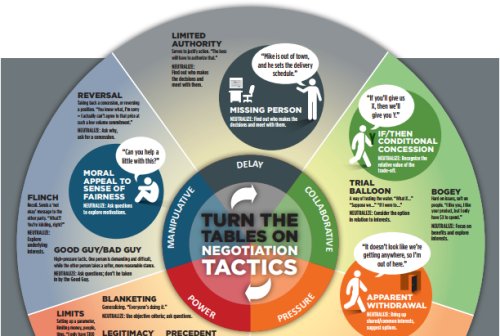I was recently the fly on the wall at a negotiation. The negotiation itself is a result of longterm planning in most cases. This article details what to do before entering a business negotiation.
Step One:
Do your homework. That means research anything that may come up in advance of the business negotiation. Absolutely, have a few notes there to back up your viewpoint. If you don't have that research, you are at a disadvantage.
Step Two:
Consider jotting down notes of what you intend to get out of the negotiation. Include things like points that are absolute deal breakers. Include points that you are likely to compromise on.
Additionally, draw or sketch out what the final deal will look like. Include financial numbers to give you an idea of what ballpark you want to end up in as a result of this business negotiation. Ie. People who are successful at business can see into the future for longterm rewards as much as they can see into the future for shortterm rewards. But clearly, having a map drawn of where your headed is valid before entering negotiation. It will also help you to be firm in your negotiation, knowing what you may be foregoing.
Step Three:
Do some market research. I know that companies can charge you millions of dollars for a simple study of getting people's opinion on something. If this business negotiation affects people, find out from people what they think. Don't limit yourself to two or three of your closest managers or friends. Extend that. Show up at a mall. Ask if you can have a minute with people. Dress appropriately to break down the barriers. People are flattered when you are seeking their opinion so to be fair, treat them appropriately and explain how their opinion will have some affect.
I have a friend in the natural concoction business. Before working on a new product, she phones up a list of customers who are agreeable and asks them about the future product. It may be well into the future but she gets the goods on the interest long before she undertakes it. Such is the case with a negotiation.
Absolutely, do your market research. Some things look good on paper but never go anywhere in the real world. For example, if you're the marketing guru behind The Clapper you would have researched this product in advance and how agreeable people would be to buying it. But say, you invented something similar like The Sneezer, then tried to market it without asking people how hard it would be, how useful it would be to them. You would undoubtedly lose your shirt.
Step Four:
Set down in advance what you as a company stand for and who you're willing to negotiate with well in advance. For example, if you believe in only dealing with union shops, then make sure you write that down and stick to it before any negotiation. There's a phrase that if you don't stand for anything, you will fall for everything. By having principles, you are already on your way.
Step Five:
Enter the negotiation with a window of time that you will allow before making any final decisions. This prevents an emotional response to the negotiation.
